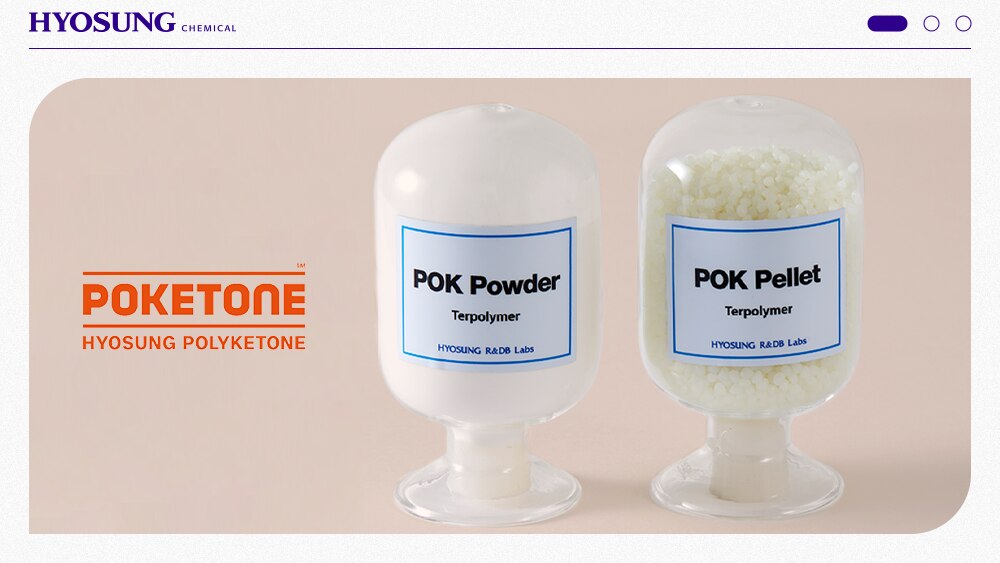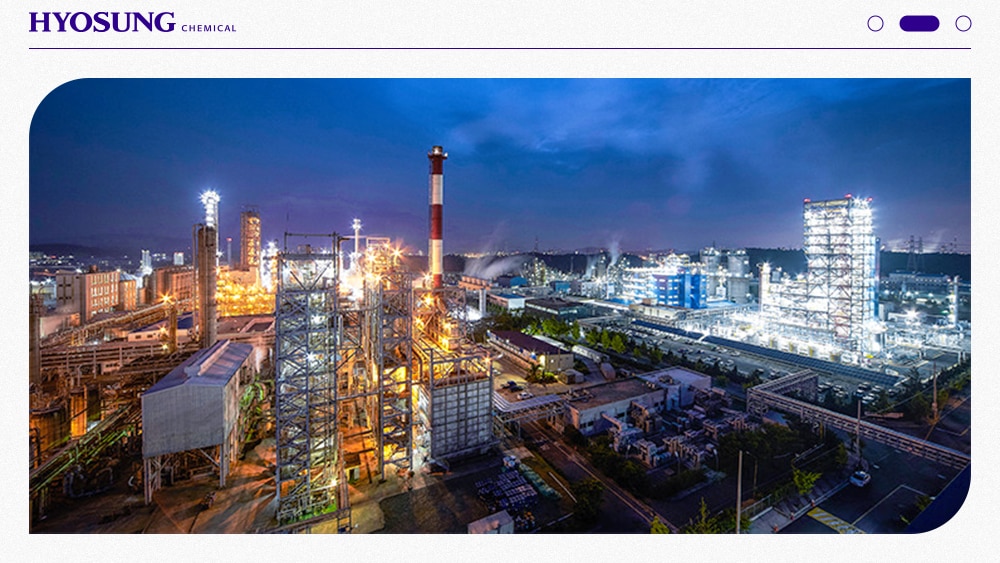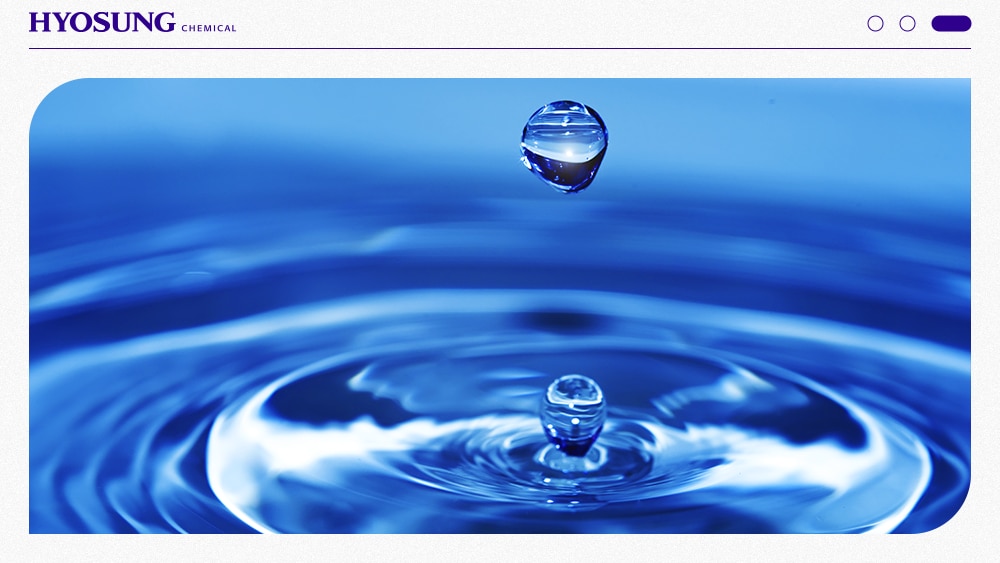Hyosung Chemical employs diverse means to preserve the Earth of tomorrow
品牌新闻
Apr 05, 2024
It has been reported lately that 1,550 species, 9% of all marine creatures, are on the verge of extinction. Also, it is estimated that at least 41% of endangered marine creatures have been affected by climate change. The danger of their extinction is generally attributed to climate change and pollution caused by man-made activities. It is notably pointed out that the destruction of seaweeds which are a food source for marine creatures, is a significant cause. Many animals and plants are endangered, in addition to marine creatures, as their habitat shrinks due to the pollution and destruction of nature caused by man-made activities. Technology has made life more convenient, but it has also caused more animals to become endangered, deprived of their habitat. To prevent nature from being destroyed by such technological development, not only consumers but also businesses should protect the environment voluntarily. They have to make efforts to recover the ecosystem to ensure the survival of future generations. To address the biodiversity crisis attributed to climate change, Hyosung Chemical has performed activities to preserve biodiversity based on its corporate responsibility. Hyosung Chemical has staged a campaign for animal behavioral enrichment to help the Asiatic black bear, Himalayan tahr, and other nationally protected animals to enjoy rich active movements as if back in the wild, jointly with Cheongju Zoo and other municipal zoos designated as “the man-made habitat for nationally-protected species.” Restoration of the ecosystem is a question related to the survival of future generations. Businesses should take initiatives to help save marine creatures, animals, and plants from losing their habitats due to climate change or environmental pollution caused by human technology development. Hyosung Chemical plans to enhance its ESG management based on its belief that climate change can be delayed, and reforms commenced to protect the environment by pursuing CSR efforts for sustainable development through ESG management with keen attention to the environment.
Hyosung Chemical’s ESG management for protecting the planet
ESG management has become so crucial as a key indicator for assessing a company’s value. ESG is an acronym for Environment, Social, and Governance, implying a philosophy that business companies should consider eco-friendly, socially responsible management for sustainable growth and transparent management through corporate governance for improvement in addition to technological innovation toward their ultimate goal of pursuing profits. Hyosung also makes relentless efforts to create added value through ESG management. In particular, it aggressively promotes the deployment of a virtuous cycle of resource use by developing eco-friendly products and technologies in tandem with measures for addressing climate change.

Hyosung Chemical produces materials contribute to the environmental protection
Hyosung Chemical exerts efforts to produce eco-friendly materials that can contribute to preserving the environment as a part of its ESG management efforts. As a result of such efforts, Hyosung Chemical independently developed eco-friendly engineering plastic for the first time in the world in 2013. As carbon monoxide, known to be the cause of air pollution, is used as raw material for producing polyketone. It has a GWP (global warming potential) lower than that of other plastic resins and is the only engineering plastic whose backbone chains all consist of carbon. Because this plastic has a high crystallization and highly compact crystal structure, it is a material that features excellent resistance against impacts, deterioration, chemicals, and fuel, besides gas barrier quality. In September 2020, Hyosung Chemical delivered 23,000 water meters made of polyketone to the Seoul Metropolitan Government in recognition of their effect on reducing carbon discharge. As part of its contribution to the city’s carbon reduction plan, the company plans to replace 30% of the city's annual demand of 2.5 million water meters made of other materials by 2030.
In addition, Hyosung Chemical actively pursues the development of PCR (post-consumer recycling) products and technologies as well. PCR plastic is a material produced utilizing plastics used and discarded by end-consumers. It has a market marked by high growth potential, with its market set to grow roughly 6% a year on average from USD 7.7 billion in 2019 to USD 10.2 billion in 2024. The growth of the PCR market is forecast to be further accelerated as the European Union has announced it will introduce regulations to require the recycling of 50% or more of plastic packaging waste by 2025. To respond to these changes in the market environment, Hyosung Chemical actively promotes its PCR business to be developed on a full scale globally and domestically by deploying a vertically integrated value chain through partnerships for products and sales, securing diverse PCR feedstock, and developing technology. In addition to completing its development of PCR PP, Hyosung Chemical is now promoting its gradual commercialization. The company recently disclosed its plan to replace single-use food containers used in Jamsil Stadium with multi-functional containers made of Hyosung PCR PP jointly with the stadium management. Hyosung Chemical continues to reduce environmental pollution attributed to plastic wastes by having its PCR PP used for more diverse applications.

Hyosung Chemical has joined the path toward a hydrogen society
The revitalization of the hydrogen economy and steady growth of eco-friendly mobility have gained traction as a global movement. To respond to the global trend towards a hydrogen society and mobility, Hyosung Chemical has devoted relentless efforts to developing a hydrogen ecosystem in partnership with the Linde Group, a world-leading group of industrial gases and engineering companies. At present, hydrogen is generated in the process of producing polypropylene resin by converting propane into resin. Hyosung Chemical has disclosed having produced and sold 12,000 tons of by-product hydrogen in the process and also plans to supply hydrogen gas by liquefying it to hydrogen filling stations the company operates throughout the country from next year. Hydrogen being sold for vehicles is expected to contribute to advancing the hydrogen economy as its application may be diversified into such diverse areas as air taxis, drones, vessels, and forklift trucks. In doing so, Hyosung Group will strive to accelerate the transformation to a hydrogen society by setting up a hydrogen-led value chain ranging from production to supply.

Hyosung Chemical’s proactive shift towards eco-friendly business
Hyosung Chemical also develops eco-friendly water treatment systems, in addition to producing and selling by-product hydrogen and developing eco-friendly materials. The company has developed and commercialized technologies for membrane water treatment systems so that the world can resolve food and potable water shortages due to prolonged drought amid climate change. The meaning of ‘membrane’ is filtering layer that filters substances by allowing only certain desired substances to pass through it. Hyosung Chemical-designed membrane water treatment system uses a hollow fiber with 0.03㎛ filtering pores. As of 2021, Hyosung Chemical has acquired two certificates by obtaining certificates for new eco-friendly membrane technologies from its development of a submerged water treatment technology in 2012, pressurized membrane filtration water treatment technology to the 2-phase submerged water treatment system.
Hyosung Chemical holds certificates for diverse eco-friendly technologies in addition to those for new eco-friendly membrane technologies. Industrial film and optical film products are RCS (recycled claim standard) certified, while polyketide is certified as a green technology and green tech product. In addition, the company has managed its plants using an environmental management system (EMS) that systematically identifies, evaluates, controls, and improves their environment. The company has also managed its environmental risk efficiently by introducing ISO14001.
Hyosung Chemical has won many awards. Hyosung Chemical's Yongyeon Plant and No. 2 Plant were awarded top honors in the business sector at the 15th Total Productive Maintenance (TPM) World Competition and top honors and the Minister of Knowledge Economy Award at the 2nd Korea Industry Facility Management Contest. Its excellent status as an ESG enterprise was recognized with its No. 1 Plant being designated as an eco-friendly enterprise in 2008 and its No. 2 Plant being selected as a ‘National Contributor to Eco-industrial Park (EP) Green Technology’.
The global climate crisis endangers Universal Health Coverage and increases the likelihood of novel viral infections and their variants. We can gauge how serious the danger is since the World Health Organization (WHO) has defined the climate crisis to be the greatest single threat to human health. The WHO has warned that roughly 250,000 people will die from malnutrition, malaria, diarrhea, heat illness, etc., due to climate change from 2030 to 2050. It has also been forecast that the health damages caused by the climate crisis will reach USD 2 to 4 billion a year. In fact, we all experienced the formidability of the climate crisis recently, including the aftermath of torrential rains and extreme drought. We learned a painful lesson that our lives and property could be deprived by climate or natural disasters. The climate crisis is no longer a matter of the distant future. Hyosung Chemical makes relentless efforts to deploy a sustainable management system so that our lives are not endangered and marine creatures do not become extinct due to looming climate change. It is Hyosung Chemical's goal to make our everyday lives easier through its material technology.